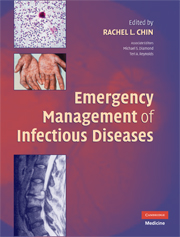Book contents
- Frontmatter
- Contents
- Preface
- Contributors
- Part I Systems
- 1 Infective Endocarditis
- 2 Myocarditis and Pericarditis
- 3 Dental and Odontogenic Infections
- 4 Systemic Diseases Causing Fever and Rash
- 5 Otitis Media
- 6 Otitis Externa
- 7 Sinusitis
- 8 Supraglottitis
- 9 Pharyngitis and Tonsillitis
- 10 Deep Neck Space Infections
- 11 Mumps
- 12 Peritonitis
- 13 Viral Hepatitis
- 14 Infectious Biliary Diseases: Cholecystitis and Cholangitis
- 15 Acute Infectious Diarrhea
- 16 Diarrhea in HIV-Infected Patients
- 17 Ulcerative Sexually Transmitted Diseases
- 18 Nonulcerative Sexually Transmitted Diseases
- 19 Vulvovaginitis
- 20 Male Genitourinary Infections
- 21 Adult Septic Arthritis
- 22 Hand Infections: Fight Bite, Purulent Tenosynovitis, Felon, and Paronychia
- 23 Osteomyelitis
- 24 Open Fractures
- 25 Spinal Infections
- 26 Prosthetic Joint Infections
- 27 Diabetic Foot Infections
- 28 Plantar Puncture Wounds
- 29 Periocular Infections
- 30 Conjunctival and Corneal Infections
- 31 Uvea, Vitreous, and Retina Infections
- 32 Community-Acquired Pneumonia
- 33 Tuberculosis
- 34 Influenza
- 35 HIV-Associated Respiratory Infections
- 36 Arthritis in the Acute Care Setting
- 37 Lower Urinary Tract Infection in Adults
- 38 Pyelonephritis in Adults
- 39 Fever and Headache: Meningitis and Encephalitis
- 40 Fever and Focal Cerebral Dysfunction
- 41 Fever and Acute Weakness Localizing to the Spinal Cord
- 42 Altered Mental Status in HIV-Infected Patients
- 43 Bacterial Skin and Soft-Tissue Infections
- Part II Pediatrics
- Part III Special Populations
- Part IV Current Topics
- Part V Overview of Antibiotics
- Part VI Microbiology/Laboratory Tests
- Part VII Infection Control Precautions
- Index
- References
42 - Altered Mental Status in HIV-Infected Patients
from Part I - Systems
Published online by Cambridge University Press: 15 December 2009
- Frontmatter
- Contents
- Preface
- Contributors
- Part I Systems
- 1 Infective Endocarditis
- 2 Myocarditis and Pericarditis
- 3 Dental and Odontogenic Infections
- 4 Systemic Diseases Causing Fever and Rash
- 5 Otitis Media
- 6 Otitis Externa
- 7 Sinusitis
- 8 Supraglottitis
- 9 Pharyngitis and Tonsillitis
- 10 Deep Neck Space Infections
- 11 Mumps
- 12 Peritonitis
- 13 Viral Hepatitis
- 14 Infectious Biliary Diseases: Cholecystitis and Cholangitis
- 15 Acute Infectious Diarrhea
- 16 Diarrhea in HIV-Infected Patients
- 17 Ulcerative Sexually Transmitted Diseases
- 18 Nonulcerative Sexually Transmitted Diseases
- 19 Vulvovaginitis
- 20 Male Genitourinary Infections
- 21 Adult Septic Arthritis
- 22 Hand Infections: Fight Bite, Purulent Tenosynovitis, Felon, and Paronychia
- 23 Osteomyelitis
- 24 Open Fractures
- 25 Spinal Infections
- 26 Prosthetic Joint Infections
- 27 Diabetic Foot Infections
- 28 Plantar Puncture Wounds
- 29 Periocular Infections
- 30 Conjunctival and Corneal Infections
- 31 Uvea, Vitreous, and Retina Infections
- 32 Community-Acquired Pneumonia
- 33 Tuberculosis
- 34 Influenza
- 35 HIV-Associated Respiratory Infections
- 36 Arthritis in the Acute Care Setting
- 37 Lower Urinary Tract Infection in Adults
- 38 Pyelonephritis in Adults
- 39 Fever and Headache: Meningitis and Encephalitis
- 40 Fever and Focal Cerebral Dysfunction
- 41 Fever and Acute Weakness Localizing to the Spinal Cord
- 42 Altered Mental Status in HIV-Infected Patients
- 43 Bacterial Skin and Soft-Tissue Infections
- Part II Pediatrics
- Part III Special Populations
- Part IV Current Topics
- Part V Overview of Antibiotics
- Part VI Microbiology/Laboratory Tests
- Part VII Infection Control Precautions
- Index
- References
Summary
INTRODUCTION
Human immunodeficiency virus (HIV)–infected patients are vulnerable to developing altered mental status (AMS) for myriad reasons including the effects of HIV itself, the accompanying immune dysfunction, associated systemic illness, comorbid psychiatric disorders, and complicated medication regimens. Highly active antiretroviral therapy (HAART) has decreased the incidence of central nervous system (CNS) opportunistic infections (OIs) and HIV-associated dementia, but the benefits are not absolute. Moreover, patients with undiagnosed or untreated HIV infection may present with AMS. In addition to CNS OIs and complications of complex multisystem disease, immune reconstitution events developing in the early weeks and months after initiating HAART may affect the brain and cause AMS.
EPIDEMIOLOGY
Before HAART became the standard of HIV care in the developed world, approximately half of HIV-infected patients developed symptomatic central or peripheral nervous system disease, with neuropathology observed in nearly all individuals dying with HIV/acquired immunodeficiency syndrome (AIDS). Since the advent of HAART, the incidence of dementia, the major cerebral OIs (cryptococcal meningitis, toxoplasmosis, progressive multifocal leukoencephalopathy [PML]), and primary CNS lymphoma (PCNSL) has fallen. HIV-associated dementia is also less common and more indolent in patients on HAART. In the United States, fewer patients now develop the mutism, quadriparesis, and incontinence that were common with late-stage infection in the early years of the AIDS epidemic.
- Type
- Chapter
- Information
- Emergency Management of Infectious Diseases , pp. 249 - 256Publisher: Cambridge University PressPrint publication year: 2008



